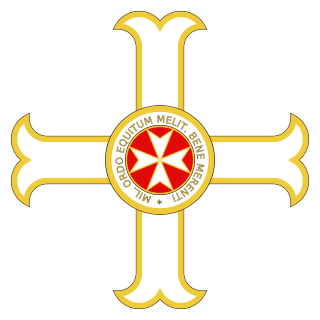This article concerns the orders and decorations of the Commonwealth realms awarded by the sovereign in right of each nation.

Military awards and decorations are distinctions given as a mark of honor for military heroism, meritorious or outstanding service or achievement. A decoration is often a medal consisting of a ribbon and a medallion.

The Order of Merit of the Federal Republic of Germany is the only federal decoration of Germany. It is awarded for special achievements in political, economic, cultural, intellectual or honorary fields. It was created by the first President of the Federal Republic of Germany, Theodor Heuss, on 7 September 1951. Colloquially, the decorations of the different classes of the Order are also known as the Federal Cross of Merit (Bundesverdienstkreuz).

An order is a visible honour awarded by a sovereign state, monarch, dynastic royal house or organisation to a person, typically in recognition of individual merit, that often comes with distinctive insignia such as collars, medals, badges, and sashes worn by recipients.
Between 1947 and 1991, during the years of the Cold War, a large number of military awards and decorations were created by various nations to recognize the undeclared hostilities of the era. Military medals of the Vietnam War and the Korean War are the best known due to the extreme level of the conflicts.
Authorized foreign decorations of the United States military are those military decorations which have been approved for wear by members of the United States armed forces but whose awarding authority is the government of a country other than the United States.

An order of merit is an honorific order that is conferred by a state, government, royal family, or other sovereign entity to an individual in recognition of military or civil merit. The historical background of the modern honours system of orders of merit may be traced to the emergence of chivalric orders during the Middle Ages.

The Military Merit Medal, post-nominal letters MMM, is a military decoration which was instituted in the Republic of South Africa on 9 October 1974 as the Chief of the Defence Force's Commendation Medal. It could be awarded to all ranks of the South African Defence Force for service of a high order.
Orders, decorations, and medals of the German Empire covers those decorations awarded by the states which came together under Prussian leadership to form the German Empire in 1871. For convenience's sake, this category also covers the decorations of the various German states which were no longer in existence in 1871, mainly because they had been annexed by Prussia during the Wars of Unification or before.

The orders, decorations and medals of Finland form a system through which the Finnish government shows its respect to persons who have distinguished themselves on some walk of life. The legal basis of the system is the Act on the displays of public recognition (1215/1999) which grants the president the authority to issue decrees on orders, medals and titles.

Orders, decorations, and medals of the Socialist Federal Republic of Yugoslavia were created during the Second World War and used throughout the existence of the Socialist Federal Republic of Yugoslavia. The first decorations were created on March 15, 1943 and included the Order of the People's Hero, Order of the People's Liberation, Order of the Partisan Star, Order of the Brotherhood and Unity, Order for Bravery and Medal for Bravery. By 1960 the total number of decorations increased to 42 and consisted of 35 orders, 6 medals and 1 commemorative medal. The designers of the Yugoslav orders and medals were Antun Augustinčić and Đorđe Andrejević Kun.
The honours system in the Republic of Austria is a means of rewarding individuals' personal achievement, or service to Austria by state decorations and medals.
The Gesetz über Titel, Orden und Ehrenzeichen, often shortened to Ordensgesetz, is a federal law of Germany detailing the treatment and handling procedures for civilian and military decorations. The law was put into effect on July 26, 1957, and fulfilled two primary purposes. First, it stipulated how medals and military decorations from before 1945 should be handled. Second, it was intended to describe treatment and procedures for medals in the Federal Republic of Germany.
This is a list of some of the modern orders, decorations and medals of France. Some like the Legion of Honour are awarded to both the armed forces and civilians. Others are decorations of a pure civilian or military character. Only four of the 19 Ministerial orders have survived the reform of the French system of decorations in 1963. The others were replaced by the Ordre national du Mérite.

The Awards and decorations of the German Armed Forces are decorations awarded by the German Bundeswehr, the German government, and other organizations to the German military and allied forces. Modern era German military awards have been presented since the establishment of the Federal Republic of Germany in 1949.
The South Korean honors system includes orders of merit, medals of honor, and commendations conferred by the South Korean government onto its citizens and foreigners.
State decorations of the Kosovo are regulated by the Law on Decorations. Decorations are divided into three grades: orders, medals and commemorative medals. The President also bestows the title of Honorary Ambassador of Kosovo to people who have made extraordinary contributions to the Republic of Kosovo. This is an honor bestowed very rarely with only nine recipients in the history of the Republic.
The orders, decorations, and medals of the German states, in which each states of Germany has devised a system of orders and awards to honour residents for actions or deeds that benefit their local community or state, are in turn subsumed within the German honours system. Each state sets their own rules and criteria on eligibility and also how each medal is awarded and presented. Most of the orders allow for the recipient to wear their orders in public.








